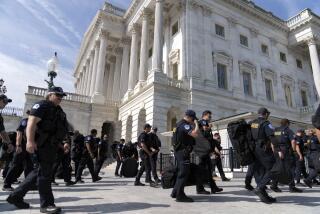Rove Draws a Hard Line Between Conservatives, Liberals Over 9/11
- Share via
WASHINGTON — A partisan furor erupted Thursday as Democrats assailed President Bush’s top political strategist, Karl Rove, for criticizing liberals over what he described as a tepid response to the Sept. 11 terrorist attacks.
“Conservatives saw the savagery of 9/11 in the attacks and prepared for war. Liberals saw the savagery of the 9/11 attacks and wanted to prepare indictments and offer therapy and understanding for our attackers,” Rove said Wednesday night at a Manhattan gathering of the Conservative Party of New York state.
Democrats said Rove’s comments represented an attempt to exploit the fight against terrorism for political gain. But the White House rejected that claim and turned aside Democratic demands for an apology or a presidential condemnation.
The flap came two days after Sen. Richard J. Durbin of Illinois, the chamber’s second-ranking Democrat, apologized for comparing the treatment of detainees in the U.S. facility at Guantanamo Bay, Cuba, to the methods used by Nazis and other brutal regimes. Republicans had demanded the apology for several days.
Together, the events underscored the depth of bitterness between the two political parties in Washington.
After excerpts of Rove’s speech began circulating Thursday morning, Democrats unleashed a barrage of criticism.
Senate Minority Leader Harry Reid (D-Nev.) said Rove should “immediately and fully apologize” or resign.
Democratic senators from the three states that lost the most lives on Sept. 11 -- New York, New Jersey and Connecticut -- denounced Rove’s comments as inflammatory, insulting, unacceptable and opportunistic.
Among them was Sen. Hillary Rodham Clinton of New York. At a hearing of the Armed Services Committee, she said that Rove’s comment “politicizes and turns into a partisan game something as serious as the attack on our nation on Sept. 11, and something as deadly as the conflict in which we are currently engaged.”
Sen. John F. Kerry (D-Mass.), the 2004 Democratic presidential nominee, took to the Senate floor and denounced Rove’s statements as “a cheap and divisive political applause line” and an “outrageous attempt to divide the nation.”
During an unusually contentious daily briefing Thursday at the White House, Press Secretary Scott McClellan said repeatedly that Rove was “simply pointing out the different philosophies and different approaches when it comes to winning the war on terrorism.”
White House Chief of Staff Andrew H. Card Jr. also supported Rove’s assertions, saying on CNN’s “Inside Politics” that “there has been a long history where some have said a response should be more of an investigative and prosecutorial response than one of taking the fight to the enemy.”
“It is outrageous that the same Democrats who stood by Dick Durbin’s libeling of our military are now expressing faux outrage over Karl Rove’s statement of historical fact,” Ken Mehlman, chairman of the Republican National Committee, said in a statement. He cited as backup for Rove’s assertions remarks by liberal filmmaker Michael Moore and the activist group MoveOn.Org, among others.
In seeking to refute Rove’s contention, Democrats noted that just three days after the attacks on the World Trade Center and the Pentagon, the Senate voted 98 to 0 -- and the House 420 to 1 -- for a resolution authorizing Bush to “use all necessary and appropriate force” against those behind the attacks. After those votes, Bush issued a statement praising Congress for being “united so powerfully.”
Commenting on the tenor of the recent rhetoric in Washington, John J. Pitney Jr., a professor of government at Claremont McKenna College, said: “There’s something deeper happening here. Not long ago, we had a fairly substantial contingent of liberal Republicans and of conservative Democrats, both in Congress and in the electorate. You just don’t have that anymore.”
The result, he said, is a deep partisan divide that is played out almost on a daily basis.
One glimmer of bipartisanship Thursday came and went with little notice in the midafternoon, when Bush spoke at a gathering at the White House complex to promote the Central American Free Trade Agreement, a pact that is facing uncertain prospects in Congress.
Among those in the audience was William M. Daley, who was Commerce secretary under President Clinton and served as chairman of Democrat Al Gore’s 2000 presidential campaign.
More to Read
Get the L.A. Times Politics newsletter
Deeply reported insights into legislation, politics and policy from Sacramento, Washington and beyond. In your inbox twice per week.
You may occasionally receive promotional content from the Los Angeles Times.










